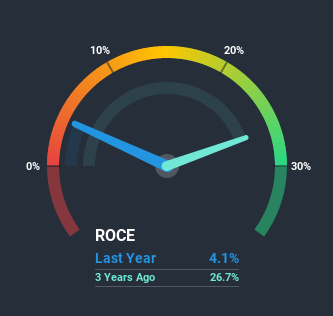Stock Analysis
What Do The Returns On Capital At NRB Bearings (NSE:NRBBEARING) Tell Us?

There are a few key trends to look for if we want to identify the next multi-bagger. Firstly, we'd want to identify a growing return on capital employed (ROCE) and then alongside that, an ever-increasing base of capital employed. Put simply, these types of businesses are compounding machines, meaning they are continually reinvesting their earnings at ever-higher rates of return. However, after briefly looking over the numbers, we don't think NRB Bearings (NSE:NRBBEARING) has the makings of a multi-bagger going forward, but let's have a look at why that may be.
What is Return On Capital Employed (ROCE)?
Just to clarify if you're unsure, ROCE is a metric for evaluating how much pre-tax income (in percentage terms) a company earns on the capital invested in its business. Analysts use this formula to calculate it for NRB Bearings:
Return on Capital Employed = Earnings Before Interest and Tax (EBIT) ÷ (Total Assets - Current Liabilities)
0.041 = ₹238m ÷ (₹9.1b - ₹3.2b) (Based on the trailing twelve months to September 2020).
Thus, NRB Bearings has an ROCE of 4.1%. In absolute terms, that's a low return and it also under-performs the Machinery industry average of 9.6%.
View our latest analysis for NRB Bearings

In the above chart we have measured NRB Bearings' prior ROCE against its prior performance, but the future is arguably more important. If you'd like, you can check out the forecasts from the analysts covering NRB Bearings here for free.
What Does the ROCE Trend For NRB Bearings Tell Us?
On the surface, the trend of ROCE at NRB Bearings doesn't inspire confidence. Over the last five years, returns on capital have decreased to 4.1% from 24% five years ago. Given the business is employing more capital while revenue has slipped, this is a bit concerning. If this were to continue, you might be looking at a company that is trying to reinvest for growth but is actually losing market share since sales haven't increased.
On a related note, NRB Bearings has decreased its current liabilities to 36% of total assets. So we could link some of this to the decrease in ROCE. Effectively this means their suppliers or short-term creditors are funding less of the business, which reduces some elements of risk. Since the business is basically funding more of its operations with it's own money, you could argue this has made the business less efficient at generating ROCE.The Key Takeaway
In summary, we're somewhat concerned by NRB Bearings' diminishing returns on increasing amounts of capital. Investors haven't taken kindly to these developments, since the stock has declined 12% from where it was five years ago. Unless there is a shift to a more positive trajectory in these metrics, we would look elsewhere.
If you'd like to know more about NRB Bearings, we've spotted 4 warning signs, and 1 of them doesn't sit too well with us.
While NRB Bearings isn't earning the highest return, check out this free list of companies that are earning high returns on equity with solid balance sheets.
If you decide to trade NRB Bearings, use the lowest-cost* platform that is rated #1 Overall by Barron’s, Interactive Brokers. Trade stocks, options, futures, forex, bonds and funds on 135 markets, all from a single integrated account. Promoted
Valuation is complex, but we're helping make it simple.
Find out whether NRB Bearings is potentially over or undervalued by checking out our comprehensive analysis, which includes fair value estimates, risks and warnings, dividends, insider transactions and financial health.
View the Free AnalysisThis article by Simply Wall St is general in nature. It does not constitute a recommendation to buy or sell any stock, and does not take account of your objectives, or your financial situation. We aim to bring you long-term focused analysis driven by fundamental data. Note that our analysis may not factor in the latest price-sensitive company announcements or qualitative material. Simply Wall St has no position in any stocks mentioned.
*Interactive Brokers Rated Lowest Cost Broker by StockBrokers.com Annual Online Review 2020
Have feedback on this article? Concerned about the content? Get in touch with us directly. Alternatively, email editorial-team (at) simplywallst.com.
About NSEI:NRBBEARING
NRB Bearings
Engages in the manufacture, marketing, and sale of ball and roller bearings for original equipment manufacturers in India and internationally.
Flawless balance sheet with solid track record and pays a dividend.

